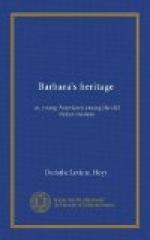Meanwhile, Mr. Sumner, Malcom, Margery, Barbara, and Bettina had gloriously enjoyed the walk out of the city through Porta Gallo, along the banks of the Mugello, up the first slope of the hill, past Villa Palmieri, and upward to San Domenico,—church and monastery,—which stands about half way to the top.
Here they stopped to rest, and to talk for a few minutes about Fra Angelico, the painter-monk, whose name has rendered historic every spot on which he lived.
Mr. Sumner told them very briefly how two young men—brothers, hardly more than boys—had come hither one day from the country over yonder, the same country where Giotto had lived when a child, about one hundred years before, and had become monks in this monastery. “They took the names of Giovanni and Benedetto; and Giovanni, or John, as it is in English, was afterward called Fra Angelico by his brethren because his life was so holy, or because, as some say, he painted angels more pure and beautiful than have ever been pictured before or since. He lived here many years before he was transferred with his brethren to the monastery of San Marco down in Florence, and painted several pictures in this church, only a part of one of which is remaining. Little did the young monk think, as he painted here in humility, that one day emissaries from the great unknown world would come hither, cut his frescoes out of the walls, and bear them away to foreign art galleries, there to be treasured beyond all price.”
They went into the church to give a look at the remaining picture over the altar in the choir, a Virgin with Saints and Angels, the lower part, or predella, of which is now in the National Gallery, London; but Mr. Sumner said they must not stay long, for this was not the object of the day. Since, however, Fra Angelico was to be their next subject of study, he wished them to know all about him they possibly could before going to San Marco to really study his pictures.
Lingering on the terrace outside, they looked at the lovely Villa Landor close at hand, where the English poet, Walter Savage Landor, spent several years. Here Malcom quoted, in a quietly impressive way:—
“From France to Italy
my steps I bent,
And pitcht at Arno’s
side my household tent.
Six years the Medicean Palace
held
My wandering Lares; then they
went afield,
Where the hewn rocks of Fiesole
impend
O’er Doccia’s
dell, and fig and olive blend.”
“How did you come to know that?” asked Margery, the usual poetry quoter.
“I didn’t have to go far for it. I came across it in my ’Hare’s Florence,’ and I rather think the quaint fancy of the Lares ’going afield’ caught my attention so that I cannot lose the words.”
“It is easier to think how one must write poetry in such a lovely spot than how one could help it,” said Bettina, with shining eyes.
“Or could help painting pictures,” added Barbara. “Just look at the colors of sky, hills, and city. No wonder Fra Angelico thought of angels with softly glittering wings and dressed in exquisite pinks and violets, when he lived here day after day.”




